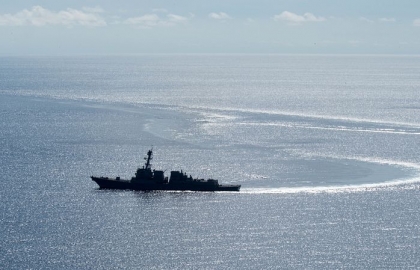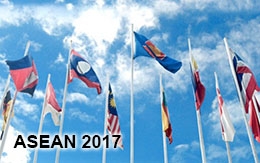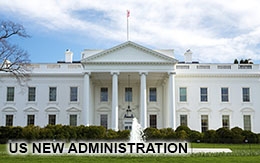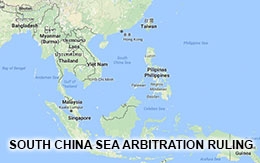U.S. joins the battle of South China Sea diplomatic notes
The US communication added a voice to the common position of Vietnam, Malaysia, Philippines and Indonesia on consideration of UNCLOS as the sole legal basis for defining, in a comprehensive and exhaustive manner, the scope of their respective maritime entitlements in the South China Sea.

On June 1, 2020, Ambassador Kelly Craft, the United States Representative to the United Nations, sent a letter to the Secretary-General of the United Nations regarding Note Verbale No. CML/14/2019. Issued by the Permanent Mission of the People’s Republic of China on December 12, 2019, the Note Verable was a response to Malaysia’s same day submission of its extended continental shelf beyond 200 nm to the Commission on the Limits of the Continental Shelf (CLCS).
By this act, the United States, a non-claimant country that is further away from the immediate region, has involved itself in the legal battle of diplomatic note exchange between China and Malaysia, the Philippines, Vietnam and Indonesia from December 2019.
The communication, however, did not comment on Malaysia’s CLCS submission and was not registered on the CLCS’s website. It may be justified by the following reasons:
-
The United States has not ratified UNCLOS and the criteria of determination of the outer limit of the continental shelf is a conventional, and not customary international norm. Article 76 of UNCLOS is new agreement while breath of territorial sea, exclusive economic zone and continental shelf are customary that are binding for all States, parties or non-parties of the Convention.
-
The 2019 Malaysia’s partial submission as well as the 2009 Malaysia-Vietnam Joint Submission of the extended continental shelf were legitimate undertakings in implementation of the obligations of State Parties to the UNCLOS 1982. The acceptance of those submissions depends on the procedures of consideration and recommendation of the CLCS.
The communication reiterates American objections to China’s maritime claims in the South China Sea (SCS) by taking a firmer stance than the US Note Verable from December 28, 2016 in multiple ways.
First, while the 2016 Note mainly focused on three documents that China issued on June 12-13, 2016 to oppose the SCS arbitral awards, the 2020 communication noted that the Tribunal ruling is final and binds China and the Philippines to respect it based on the Article 296 of the Convention. China’s claim to historic rights in the SCS is incompatible with the Convention to the extent that it exceeds the limits of China’s possible maritime zones as specifically provided in Articles 2, 57 and 76 of the Convention. Second, the United States strongly urges China to conform its maritime claims with the international law as reflected in the Convention; to comply with the Tribunal’s July 12, 2016 decision; and to cease its provocative activities in the South China Sea. The term “provocative activities” was absent in the 2016 note but has been regularly used in recent speeches made by American officials such as the US Department of State Report on the Indo-Pacific Strategy in November 2019. Third, the United States has the responsibility to make formal protests to these unlawful assertions that interfere with the rights and freedoms enjoyed by the United States and all other States. Fourth, the communication noted that high tide features in the Spratlys, qualified by the Tribunal Award as rocks based on the article 121 (3), have normal baselines only as described in Article 5 of UNCLOS. The method of straight baselines is only applied in localities where the coastline (of the mainland or island) is deeply indented and cut into, or if there is a fringe of islands along the coast in its immediate vicinity, or where the coastline is highly unstable by the presence of a delta and other natural conditions. None of the above conditions apply for the Spratlys. Fifth, the United States noted that entirely submerged features like Macclesfield Bank or James Shoal, and low-tide elevations like Mischief Reef and Second Thomas Shoal, cannot generate a territorial sea or other maritime zones under international law. Any land reclamation work and construction of military bases on those features cannot change their legal situation. Sixth, the communication also emphasized that the previous notes of the Philippines, Vietnam and Indonesia have had the same viewpoint on unlawful Chinese claims. In other words, the communication encourage regional countries to support the Tribunal ruling and international law for settlement of disputes. Finally, the United States Representative wanted to circulate the communication to all UN Member States as a document of the General Assembly under Agenda Item 74(a) and of the Security Council. This step shows that the US is starting to bring attention to activities in the SCS that can be threatening to international peace and security situations. As a permanent member of the Security Council, the United States has a duty to introduce such matters into the agenda of the Security Council when necessary.
On 3 June 2020, the Chinese foreign spokesperson pushed back on the US objections by asserting that China formed territorial sovereignty through a long historical process and had maritime rights and interests in the SCS, which are also in line with UN Charter and UNCLOS. China added that the US is not a party to the SCS disputes, therefore it should not take sides or regularly raise tensions with its military presence in the SCS in turn dividing countries in the region. In Chinese words, those activities are not conducive to the stability and peace in the SCS. It should recall that only China whose uses of force in 1974 and 1988 in the Paracels and Spratlys respectively were incompatible with Article 2 of the UN Charter.
Indeed, by reducing maritime zones of high tide features in the Spratlys islands to no more than 12 nm, the ruling unveiled the possibility of existence of High Sea and Area – the common heritage of mankind in the center of the SCS. Beyond traditional freedoms of the sea, the High Sea and Area clause allows other states to enjoy the rights and interests to the resources of the sea bed in the areas outside of the excessive maritime claims which are inconsistent with UNCLOS. The United States communication may entail similar actions from other countries to protect their maritime rights and interests that are provided legally by UNCLOS.The communication added a voice to the common position of Vietnam, Malaysia, Philippines and Indonesia on consideration of UNCLOS as the sole legal basis for defining, in a comprehensive and exhaustive manner, the scope of their respective maritime entitlements in the SCS.
The situation in the SCS can only be controlled when countries restrain and cooperate in resolving disagreements on the basis of goodwill and in compliance with international law, including UNCLOS.
Nguyen Hong Thao is an Associate Professor of the National University of Hanoi and Diplomatic Academy of Vietnam.
A shorter version of the article was first published by The Diplomat.










